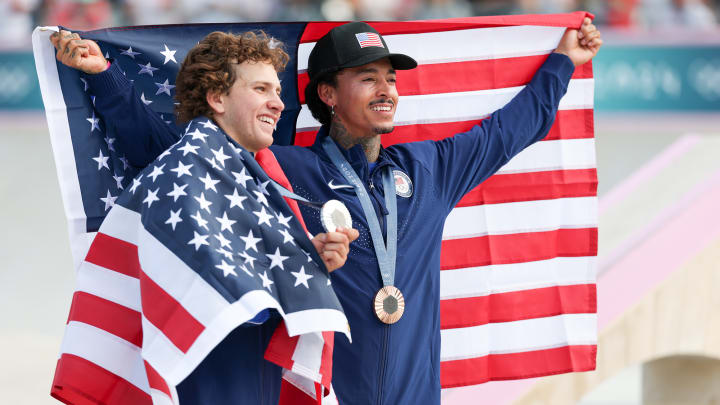Jagger Eaton, Nyjah Huston Win Silver and Bronze Medals As Skateboarding Shines in Olympic Spotlight

PARIS — The street skateboarding medalists all sat atop a stage late Monday, exhibiting an afterglow from the glorious evening that had just unfolded. All had competed in a venue that dropped jaws, in front of a crowd that roared and in a sport that’s rapidly changing and advancing.
The American Jagger Eaton, who won the silver medal, was cracking jokes and dropping truths. He joked about his teammate and bronze medalist, Nyjah Huston, saying that Huston sounded like “an old, creaking door,” as he sat down. He spoke honestly about the inherent danger of skateboarding and the fear competitors feel before attempting every trick. He explained how far his sport has come, from its Olympic debut three years ago to an ever-wider audience of fans who enjoy these types of Games far more than the X Games.
Huston, seated two seats to Eaton’s left, smiled and nodded. Here he was, the 15-time X Games winner and six-time world champion, the skateboarder with 5 million-plus Instagram followers and a back story worthy of the big screen. He had infamously finished seventh in Tokyo, apologizing afterward to “all the people I let down.” He had come to Paris knowing the stakes but reducing them, in an attempt to dismiss the pressure he felt in Tokyo. He had just won bronze, and he didn’t seem the least bit disappointed.
Japan’s Yuto Horigome—the reigning Olympic gold medalist who successfully defended his title in Paris—sat between them. He was proof of how far Eaton, Huston and skateboarding in general had come. The Olympics made them all better. Each skater sitting there had pushed and pushed, inventing new tricks and learning more difficult ones until the field was deep and deeply competitive.
“Yuto’s a savage,” Huston said, and he meant that as the highest praise. “There’s no other way to say it.”
A reporter asked all three if what just happened had made for the greatest men’s skateboard street final ever, regardless of competition. Eaton all but screamed “YES!” into his microphone, his affirmative echoing throughout the venue. He cited “gnarly, gnarly tricks” and “the energy of the crowd” and how each of them kept reaching deeper, just like any other Olympian.
“It honestly felt like a bunch of friends having an amazing day of skateboarding,” Eaton said. “Probably the best ever.”
In Tokyo, skateboarding made its debut. In Paris, it shifted toward becoming a bona fide—and compulsively watchable—Olympic sport.
Part of that owed to the venue. The competition was held in La Concorde Urban Park, an open, outdoor arena with tall trees and massive iron gates lining the perimeter. Depending on where one stood, there were views of the Eiffel Tower, marble statues of gods and goddesses, museums and water fountains painted green, black and gold. Beats thumped from giant speakers. A full crowd packed into the grandstands—and not for the monuments.
After Saturday’s rain caused a two-day postponement, the qualifying rounds unspooled in the afternoon, under a blazing sun—the hottest, brightest, most glorious day of the Olympics yet. Huston left no doubt of his rebound from Tokyo, qualifying in second, after Eaton. Horigome finished in fourth.
In the final, the eight riders navigated handrails, stairs sets, ledges and banks. They were judged on which tricks they chose, how well they performed them and their technical skills. They got bonus points for the best tricks executed in any one section.
At one point, Huston took the lead with a wild trick. He flipped his body and board around, then landed on the very left edge of his board, atop a rail, then dismounted, nearly falling and just staying upright. “Skateboarding … is not … easy, man,” he said afterward.
Eaton took his turn next. He got so much air he looked like Michael Jordan, only atop a skateboard. He landed on the edge of his board, then nearly fell backward before sticking the landing. A look of amazement at his own exploits stuck on his face for minutes. “it’s special,” he said afterward.
Horigome moved in front, right at the very end. When someone asked why Japan had become so dominant at skateboarding, he laughed and blushed and clapped his hands.
"Yeah,” Eaton chimed in. “We would like to know that.”
If Horigome knew, he wasn’t saying. It didn't matter. On Monday night, skateboarding won, solidifying its place in the Summer Games.
“To be up here on the podium with these guys, it feels like we deserve it,” Huston said.
